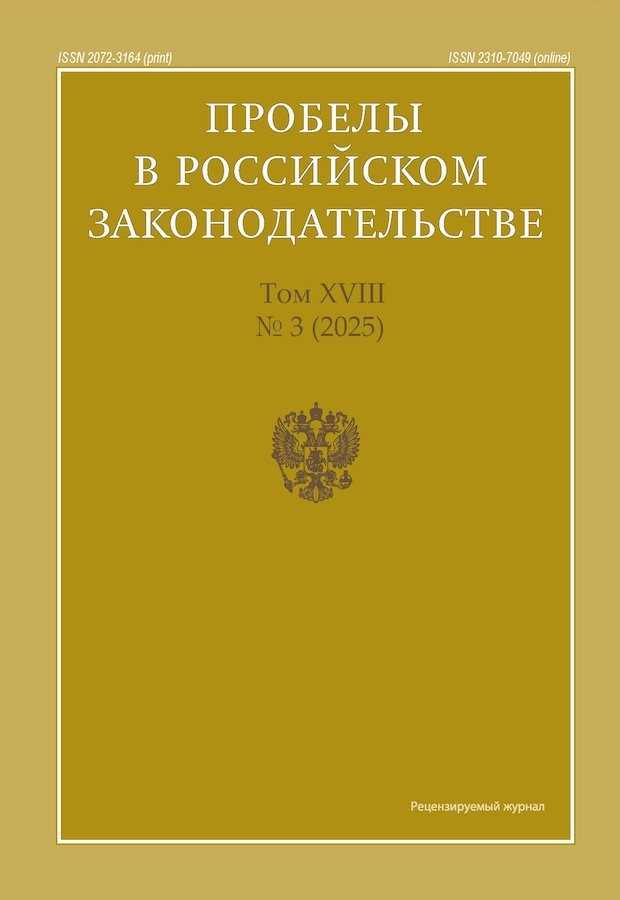The role and place of artificial intelligence in modern society: from terminological uncertainty to the legal regulation of its use in law enforcement activities
- Authors: Maydykov A.A.1, Ogurtsov A.E.1, Konashenkov S.О.2
-
Affiliations:
- Academy of Management of the Ministry of Internal Affairs of Russia
- V.Y. Kikoty Moscow University of the Ministry of Internal Affairs of Russia
- Issue: Vol 18, No 3 (2025)
- Pages: 186-196
- Section: Criminal Law Sciences
- URL: https://journals.eco-vector.com/2072-3164/article/view/687950
- EDN: https://elibrary.ru/YEUXIR
- ID: 687950
Cite item
Abstract
This article examines the challenges associated with the implementation of artificial intelligence (AI) technologies in law enforcement. It analyzes key limitations and risks arising from the use of algorithmic systems, including technical shortcomings, legal uncertainty, potential bias in machine learning models, and the need to protect personal data. The study also explores the compatibility of existing regulatory frameworks with technological advancements and the prospects for their adaptation.
The research aims to:
- Analyze modern approaches to AI regulation in law enforcement at national and international levels;
- Identify legal, technical, and social barriers hindering AI implementation;
- Explore potential ways to mitigate legal risks related to automated decision-making;
- Propose recommendations for improving AI legislation and ensuring its safe application.
The results provide an assessment of the current state of AI regulation in law enforcement and offer directions for its further development.
Full Text
About the authors
Andrey A. Maydykov
Academy of Management of the Ministry of Internal Affairs of Russia
Author for correspondence.
Email: maydykov@mail.ru
SPIN-code: 9824-0017
Cand. Sci. (Law), Assoc. Prof., Assoc. Prof. of the Department of Organization of Operational Investigative Activities
Russian Federation, MoscowAlexander E. Ogurtsov
Academy of Management of the Ministry of Internal Affairs of Russia
Email: a.ogurzov@mail.ru
SPIN-code: 7264-4687
Cand. Sci. (Law), Assoc. Prof., Deputy Head of the Department of Organization of Operational Investigative Activities
Russian Federation, MoscowSergey О. Konashenkov
V.Y. Kikoty Moscow University of the Ministry of Internal Affairs of Russia
Email: conashenkov.s@yandex.ru
SPIN-code: 8434-1066
student
Russian Federation, MoscowReferences
- Artificial Intelligence in Law, or Does a Special Branch of Law Exist Regulating the Functioning of AI Entities. Bondarenko, N., Konanevich, Y., Rudovich, N., et al. Intellectual Property in Belarus, 2024. No. 5(108), Pp. 6–16. EDN: GYPDZE. (in Rus.).
- Mishina N.V. Artificial Intelligence Law as a New Sphere of Legal Regulation or a New Branch of Law. Eurasian Union of Scientists, 2020. No. 3–5(72), Pp. 62–65. EDN: FEXOSJ. (in Rus.).
- Milinchuk D.S. Artificial Intelligence in Law: Trends, Threats, and Prospects of Law in the Modern Stage of Societal Development. Property Relations in the Russian Federation, 2021. No. 7(238). Pp. 70–76. doi: 10.24412/2072-4098-2021-7-70-76. EDN: LLXAHU. (in Rus.).
- Tyulin A.V. Artificial Intelligence as a Means of Protecting Civil Rights and Its Connection to Human Rights. Law and State: Theory and Practice, 2024. No. 9(237). Pp. 389–392. doi: 10.47643/1815-1337_2024_9_389. EDN: ENOKIS. (in Rus.).
- Kosykh A.A. Artificial Intelligence Law in the Legal System: A Branch of Law or a Legal Institution? Bulletin of the Vladimir Law Institute, 2021. No. 1(58). Pp. 159–164. EDN: FKLCQU. (in Rus.).
- Artificial Intelligence Law as a New Sphere of Legal Regulation or a New Branch of Law. Akmyradova O., Selimkhanova E., Arslanova L., & Allanov, A. In Problems of Modern Integration Processes. Ways to Implement Innovative Solutions: Proceedings of the International Scientific-Practical Conference, Voronezh, January 27. Ufa: Omega Science LLC. 2025. Pp. 5–9. EDN: FOZLPI.
- Polyakova T.A. "Artificial Intelligence Law" and Its Place in the System of Information Law. Polyakova T.A., Kamalova, G.G. Rule of Law: Theory and Practice, 2021. No. 3(65), Pp. 133–145. doi: 10.33184/pravgos-2021.3.11. EDN: NVPTQG. (in Rus.).
Supplementary files









